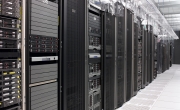HP Labs announces new research advancing environmental sustainability

HP Labs this week previewed two new research programs aimed at reducing HP customers' energy use, both of which further the company's commitment to advancing environmental sustainability.
The prototype HP Labs Home Energy Intelligence Service promises to help homeowners lower their energy consumption through the application of a home management tool that remotely monitors and assesses patterns of residential energy use. Meanwhile, a new, 50,000 square-foot facility in Fort Collins, Colo., is designed as a ‘living laboratory' for research into reducing the environmental impact of next generation data centers.
Tackling energy use in the home
Announced at the launch of HP's new global Unlocking Your Energy initiative, the HP Labs Home Energy Intelligence Service is a proof of concept for a service that could offer homeowners valuable information about what they can do to save energy.
The project began just over a year ago with researchers deploying sensors in residential homes that collected energy data for individual appliances and "activity zones" within each house. An HP gateway in each home received readings from these sensors every 3 seconds which it then sent to the cloud in an aggregated data set every 2 minutes. Over 20 million sensor readings were collected in all. That data was analyzed in real time to produce information – such as family usage patterns and the efficiency of appliances – displayed back in the home via a simple, intuitive interface that offered recommendations the homeowners could act on easily – like shifting usage to optimize costs, or remembering not to leave the TV or lights on overnight.
"Our goal is to turn the discovery of a home's current energy behaviors and usage patterns into a compelling experience, and one that leads to energy savings with an aggressive payback for the investment," says Chandrakant Patel, senior fellow and director of the Sustainable Ecosystems Research Group at HP Labs.
"We now live in a world where everybody is on and connected, and soon, everything will be on and connected as well," adds Patel. "Given HP's scale and offerings, that offers us a great opportunity to monitor, analyze, and control energy usage."
A ‘living laboratory' for the sustainable data center

HP research facility in Fort
Collins,
Colorado
HP's new Fort Collins research facility aims to exploit that same combination of pervasive cross layer sensing, data collection, analysis and feedback to trigger actions that can dramatically reduce energy consumption.
Built in collaboration with HP's Enterprise Servers, Storage, and Networking group, the research center will in part explore how advances in fields such as data analytics and new sensor technologies can better support HP's Data Center Smart Grid offerings. To that end, the facility will study new resource management techniques that, for example, utilize cooling microgrid. This consists of air- and water-side economizers that take advantage of the low humidity in the Rocky Mountains region.
The center will also house the HP Labs Sandbox, a research environment that is isolated both environmentally and electronically from the rest of the facility and that will serve as a test bed for the broad array of next generation sustainability technologies currently being developed at HP Labs.
"Our clients are seeking sustainable, affordable data center technologies that will effectively change the energy equation," says Tom Christian, principal research scientist of the Sustainable Ecosystems Research Group at HP. "The new Fort Collins research facility advances the development of solutions that address CIOs most pressing needs, including lowered energy consumption and reduced costs."